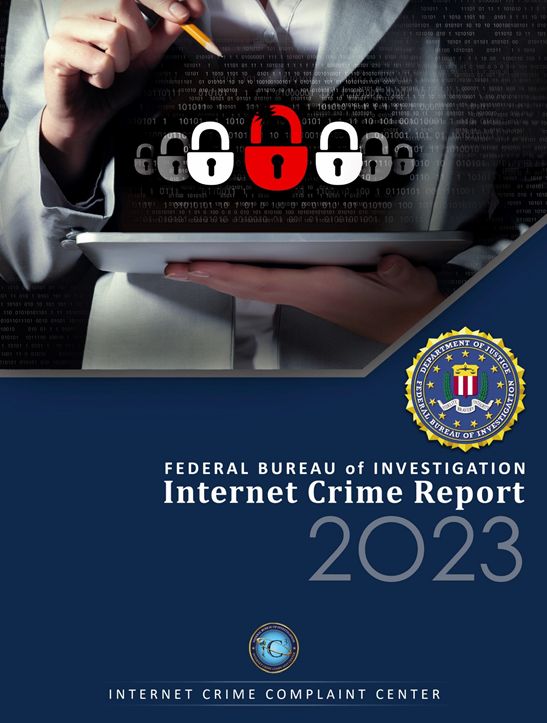Federal Bureau of Investigation Internet Crime Report 2023
INTRODUCTION
Dear Reader,
Today’s cyber landscape is threatened by a multitude of malicious actors who have the tools to conduct large-scale fraud schemes, hold our money and data for ransom, and endanger our national security. Profit-driven cybercriminals and nation-state adversaries alike have the capability to paralyze entire school systems, police departments, healthcare facilities, and individual private sector entities. The FBI continues to combat this evolving cyber threat. Our strategy focuses on building strong partnerships with the private sector; removing threats from US networks; pulling back the cloak of anonymity many of these actors hide behind; and hitting cybercriminals where it hurts: their wallets, including their virtual wallets.
Critical to the FBI’s efforts is the Internet Crime Complaint Center (IC3). IC3 gives the public a direct way to report cybercrime to the FBI and enables us to collect data, advance investigations, and identify changes in the threat landscape. In 2023, IC3 received a record number of complaints from the American public: 880,418 complaints were registered, with potential losses exceeding $12.5 billion. This is a nearly 10% increase in complaints received, and it represents a 22% increase in losses suffered, compared to 2022. As impressive as these figures appear, we know they are conservative regarding cybercrime in 2023. Consider that when the FBI recently infiltrated the Hive ransomware group’s infrastructure, we found that only about 20% of Hive’s victims reported to law enforcement. More reporting from victims would mean superior insight for the FBI.
The past year, investment fraud was once again the costliest type of crime tracked by IC3. Losses to investment scams rose from $3.31 billion in 2022 to $4.57 billion in 2023—a 38% increase. The second-costliest type of crime was business e-mail compromise (BEC), with 21,489 complaints amounting to $2.9 billion in reported losses. Tech support scams, meanwhile, were the third-costliest type of crime tracked by IC3. Notably, different age groups tended to be impacted by different crimes. Victims 30 to 49 years old were the most likely group to report losses from investment fraud, while the elderly accounted for well over half of losses to tech support scams.
In 2023, ransomware incidents continued to be impactful and costly. After a brief downturn in 2022, ransomware incidents were again on the rise with over 2,825 complaints. This represents an increase of 18% from 2022. Reported losses rose 74%, from $34.3 million to $59.6 million. Cybercriminals continue to adjust their tactics, and the FBI has observed emerging ransomware trends, such as the deployment of multiple ransomware variants against the same victim and the use of data-destruction tactics to increase pressure on victims to negotiate.
Last year also saw notable achievements for law enforcement. The FBI’s commitment to assisting cyber victims and fostering partnerships allowed for the continued success of IC3’s Recovery Asset Team (RAT). Established in 2018, RAT streamlines communications with financial institutions and FBI field offices to facilitate the freezing of funds for victims. In 2023, IC3’s RAT initiated the Financial Fraud Kill Chain (FFKC) on 3,008 incidents, with potential losses of $758.05 million. A monetary hold was placed on $538.39 million, representing a success rate of 71%.
As the cyber threat continues to evolve, the FBI remains appreciative of those who report cyber incidents to IC3. Information reported to the FBI helps advance our investigations. Your reporting is critical for our efforts to pursue adversaries, share intelligence with our partners, and protect your fellow citizens. Cybersecurity is the ultimate team sport, and we are in this fight together. The FBI is committed to fostering greater security in a digitally connected world, and we are eager to work with the American public to defeat cyber adversaries and bring criminals to justice.
Timothy Langan
Executive Assistant Director
Federal Bureau of Investigation


